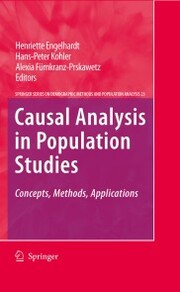Detailansicht
Causal Analysis in Population Studies
eBook - Concepts, Methods, Applications, The Springer Series on Demographic Methods and Population Analysis
ISBN/EAN: 9781402099670
Umbreit-Nr.: 1602517
Sprache:
Englisch
Umfang: 252 S., 5.58 MB
Format in cm:
Einband:
Keine Angabe
Erschienen am 05.05.2009
Auflage: 1/2009
E-Book
Format: PDF
DRM: Digitales Wasserzeichen
- Zusatztext
- <P>The central aim of many studies in population research and demography is to explain cause-effect relationships among variables or events. For decades, population scientists have concentrated their efforts on estimating the causes of effects by applying standard cross-sectional and dynamic regression techniques, with regression coefficients routinely being understood as estimates of causal effects. The standard approach to infer the effects of causes in natural sciences and in psychology is to conduct randomized experiments. In population studies, experimental designs are generally infeasible.</P><P>In population studies, most research is based on non-experimental designs (observational or survey designs) and rarely on quasi experiments or natural experiments. Using non-experimental designs to infer causal relationshipsi.e. relationships that can ultimately inform policies or interventionsis a complex undertaking. Specifically, treatment effects can be inferred from non-experimental data with a counterfactual approach. In this counterfactual perspective, causal effects are defined as the difference between the potential outcome irrespective of whether or not an individual had received a certain treatment (or experienced a certain cause). The counterfactual approach to estimate effects of causes from quasi-experimental data or from observational studies was first proposed by Rubin in 1974 and further developed by James Heckman and others.</P><P>This book presents both theoretical contributions and empirical applications of the counterfactual approach to causal inference.</P>
- Kurztext
- <p>The aim of many studies in population research and demography is to explain cause-effect relationships among variables or events. This book presents both theoretical contributions and empirical applications of the counterfactual approach to causal inference.</p>
